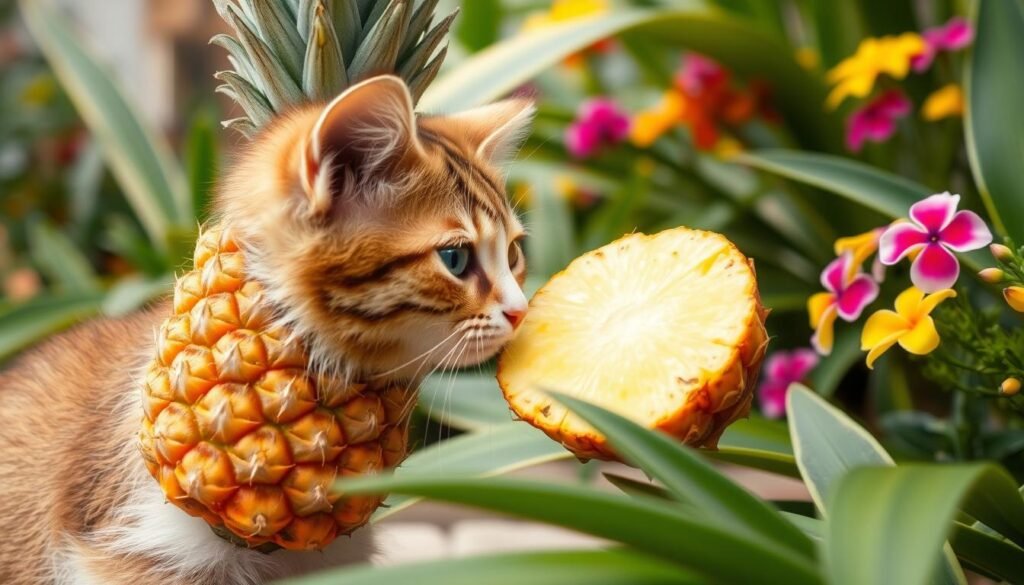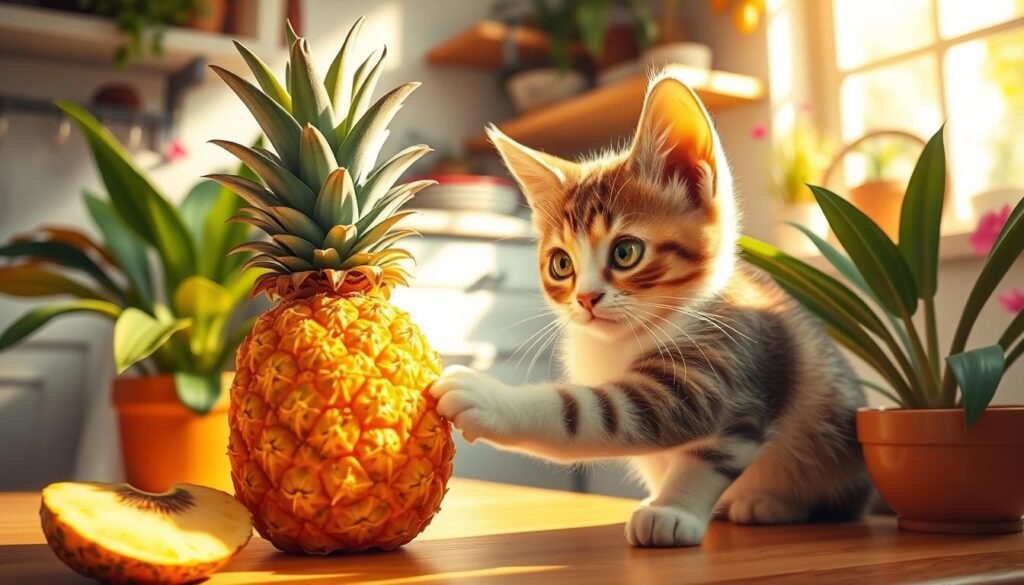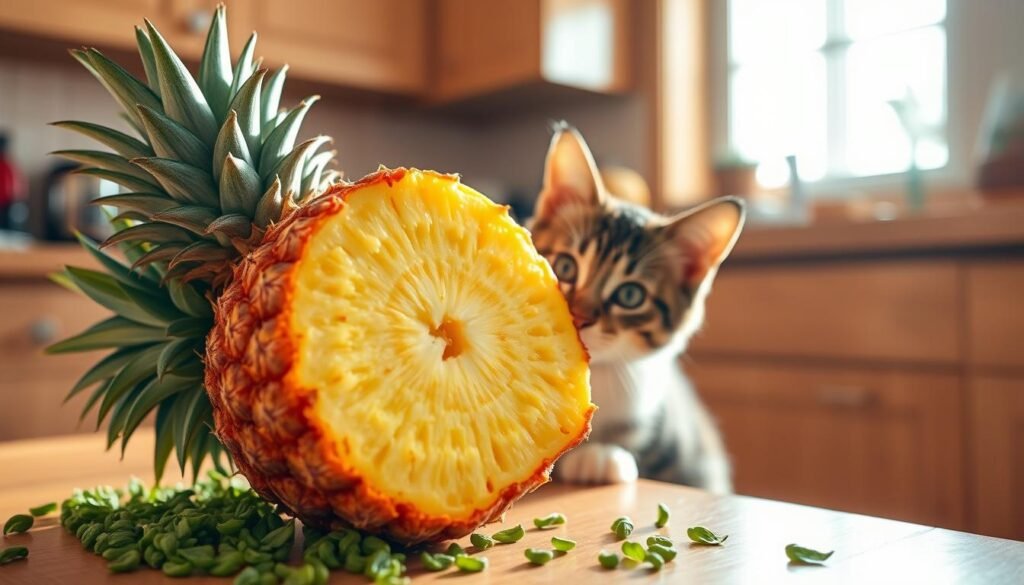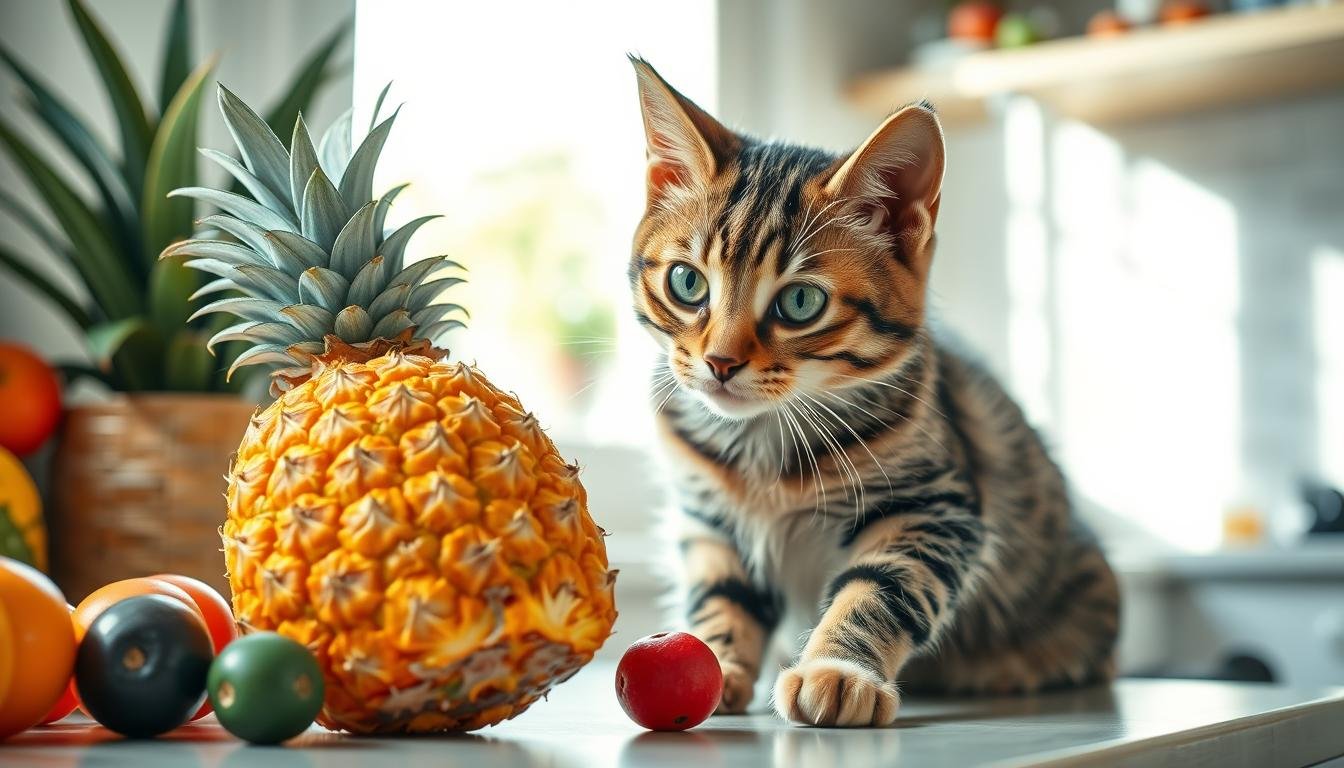As a cat owner, I’m always curious about safe human foods for my feline friend. It’s key to know the benefits and risks of each food. Pineapple for cats is a topic many are interested in, thanks to its vitamins and minerals. But can cats eat pineapple? This article will dive into the truth about cats and pineapple, covering the good and the bad of feeding pineapple to your cat.
Whether you’re new or experienced in cat care, knowing about cat nutrition is vital. Pineapple can be a healthy treat for cats, but caution is needed. By the end of this article, you’ll know how to make smart choices for your cat’s diet.
Key Takeaways
- Consider the nutritional benefits of pineapple for cats
- Understand the potential risks associated with feeding pineapple to your cat
- Learn how to introduce pineapple into your cat’s diet safely
- Discover the importance of cat nutrition in maintaining your cat’s overall health
- Explore the differences between fresh and canned pineapple for cats
- Learn how to identify potential allergic reactions or digestive issues in your cat
The Truth About Cats and Pineapple
As a cat owner, knowing about a feline diet is key. Cats need a lot of protein from animal sources. When thinking about adding tropical fruits like pineapple, it’s important to consider the good and bad sides.
It’s crucial to understand your cat’s digestive system. Cats have a shorter digestive tract and more acidic stomachs than humans. This means they process food differently, including fruits like pineapple.
Is Pineapple Toxic to Cats?
Pineapple isn’t toxic to cats, but caution is still needed. The high sugar in pineapple can cause digestive problems or other health issues.
What Makes Pineapple Different from Other Fruits?
Pineapple has an anti-inflammatory called bromelain, which is good for cats. But, it’s important to think about pineapple’s nutritional value and how it fits into a cat’s diet.
Understanding Your Cat’s Digestive System
Cats are built to digest a lot of protein and fat from meat. When adding fruits like pineapple, do it in small amounts. Make sure it’s part of a balanced diet that focuses on cat health.
Knowing how a cat’s digestive system works and the pros and cons of pineapple can help you make better diet choices. Always choose a balanced diet that meets your cat’s nutritional needs.
Nutritional Benefits of Pineapple for Cats
As a cat owner, I’m always searching for ways to give my feline friend a balanced diet. It’s key to think about the benefits of fruits like pineapple for cat nutrition. Pineapple is packed with vitamins A and C, potassium, and fiber. These nutrients offer many pineapple benefits for cats.
Some of the main nutritional perks of pineapple for cats include:
- Rich in vitamins and minerals: Pineapple is full of vitamins A and C, potassium, and fiber. These can help keep your cat healthy and happy.
- Anti-inflammatory properties: Pineapple has bromelain, which can reduce inflammation and aid digestion in cats.
- Supports healthy digestion: The fiber in pineapple helps with digestion and prevents constipation in cats.
It’s important to add pineapple to your cat’s diet in small amounts. While it’s a healthy treat, it should be balanced with their regular cat nutrition. By knowing the pineapple benefits and adding it wisely, you can boost your cat’s health and happiness.
Potential Risks When Feeding Pineapple to Your Cat
As a cat owner, it’s important to think about the cat health risks of feeding pineapple. Pineapple can be good for them, but it must be given safely. The high sugar in pineapple can upset a cat’s stomach.
It’s key to balance your cat’s diet with the right nutrients and avoid dangers. Pineapple can be a good treat in small amounts. But, some cats might be allergic, leading to digestive problems or severe reactions.
To avoid risks, start with a little pineapple and watch your cat closely. Here are some tips:
- Start with a small amount (about 1-2 teaspoons) to test your cat’s tolerance
- Monitor your cat’s behavior and watch for any signs of digestive issues or allergic reactions
- Choose fresh pineapple over canned varieties to avoid added sugars and preservatives

By being careful and slow when introducing pineapple, you can keep your cat safe and healthy. Always put your cat’s nutrition first and talk to your vet if you’re unsure about pineapple.
| Potential Risk | Signs to Watch For |
|---|---|
| Digestive Issues | Vomiting, diarrhea, abdominal pain |
| Allergic Reactions | Hives, itching, swelling, difficulty breathing |
Can Cats Eat Pineapple Safely? The Right Way to Share
As a cat owner, you might want to share pineapple with your pet. But, cat safety is key. When adding pineapple to your cat’s feline diet, do it safely and in small amounts.
Start with fresh, ripe pineapple without added sugars or preservatives. You can give it as a treat, alone or with other safe foods. Always watch your cat for any signs of trouble, like digestive issues or allergies.

- Only offer small amounts (about 1-2 teaspoons per 10 pounds of body weight) to prevent digestive upset
- Avoid giving your cat pineapple cores, leaves, or tough skin, as they can cause choking or intestinal blockages
- Don’t make pineapple a regular part of your cat’s feline diet, as it can lead to an imbalanced nutrient intake
By following these tips and focusing on cat safety, you can share pineapple with your cat safely. Always talk to your vet if you’re unsure about your cat’s diet or health.
Fresh vs Canned Pineapple: What’s Better for Your Cat?
Choosing between fresh and canned pineapple for your cat is important. Fresh pineapple is full of vitamins and minerals that help your cat stay healthy. But, canned pineapple might have added sugars and preservatives that are bad for your cat.
Fresh pineapple is best when it’s ripe and fresh. You can give it to your cat as a treat or mix it with their food. Just make sure to remove the tough skin and cut it into small pieces to avoid choking. Canned pineapple, on the other hand, is packed in syrup that’s high in sugar and calories. This can cause digestive problems and other health issues in cats.

Here are some key differences between fresh and canned pineapple for your cat:
- Fresh pineapple is higher in fiber and antioxidants
- Canned pineapple is often lower in nutrients and higher in sugar
- Fresh pineapple can be served as a healthy treat, while canned pineapple should be avoided due to its high sugar content
In conclusion, fresh pineapple is better for your cat. It’s more nutritious and less likely to cause digestive problems. So, it’s a great choice to support your cat’s health and cat nutrition.
| Pineapple Type | Nutritional Value | Risk of Digestive Issues |
|---|---|---|
| Fresh Pineapple | High in fiber and antioxidants | Low |
| Canned Pineapple | Lower in nutrients, higher in sugar | High |
How Much Pineapple Can Your Cat Have?
Sharing pineapple with your cat needs careful thought about the cat serving size. The right amount depends on your cat’s age, weight, and health. A good rule is to give 1-2 teaspoons of pineapple for every 10 pounds of body weight.
A balanced feline nutrition plan includes many nutrient-rich foods. Pineapple can be a healthy treat in small amounts. But, remember the sugar and possible digestive problems with pineapple for cats. Start with small amounts to keep your cat’s digestive system happy.
Here is a rough guide to cat serving size for pineapple:
| Cat Weight | Pineapple Serving Size |
|---|---|
| 5-10 pounds | 1/4 teaspoon |
| 11-20 pounds | 1/2 teaspoon |
| 21-30 pounds | 3/4 teaspoon |
Every cat is unique, so always talk to your vet for advice on pineapple for cats and feline nutrition.
Signs Your Cat Should Not Eat Pineapple
As a cat owner, knowing about cat health issues from pineapple is key. While pineapple can be good for cats, some health problems make it bad. Cats with digestive issues or feline nutrition problems should avoid pineapple.
Medical issues like diabetes, kidney disease, and food allergies can make pineapple bad for cats. Symptoms like vomiting, diarrhea, lethargy, or loss of appetite mean no pineapple. Always talk to your vet about your cat’s cat health issues.
Medical Conditions to Consider
- Diabetes: Pineapple’s sugar can worsen diabetes in cats.
- Kidney disease: Pineapple’s potassium is bad for cats with kidney disease.
- Food allergies: Some cats may react badly to pineapple, causing symptoms.
When to Consult Your Vet
If you’re not sure about pineapple for your cat, see your vet. They can suggest the right diet for your cat. This way, you can keep your cat happy and healthy.
Better Fruit Alternatives for Your Feline Friend
As a cat owner, it’s key to give your pet a balanced diet with cat-friendly fruits. Pineapple is tasty, but there are safer, more nutritious options.
Choosing the right fruits for feline nutrition is important. Bananas, apples, and berries are great choices. They’re not only tasty but also good for your cat’s health.
Here are some cat-friendly fruits you can try:
- Bananas: rich in potassium and easy to digest
- Apples: a good source of fiber and antioxidants
- Blueberries: packed with vitamins and antioxidants
Always introduce new fruits slowly and in small amounts. This helps prevent digestive issues. Always check with your vet before changing your cat’s diet.
Conclusion: Making the Right Choice for Your Cat
As we wrap up our look at cats and pineapple, it’s clear that pineapple can be good for them but with care. We must understand what our pets need and how they digest food. This helps us decide if pineapple is right for them.
By thinking about cat nutrition, pineapple for cats, and feline health, we see that pineapple can be a nice treat. But, it should be given in small amounts and with your vet’s okay. Watching how your cat reacts and being aware of risks like sugar and digestive problems is key to their health.
Choosing to give pineapple to your cat should consider their special needs and likes. By staying informed and talking to your vet, you can make choices that keep your cat happy and healthy. Remember, your cat’s health and happiness are most important. A balanced diet is the base for a long, joyful life together.

